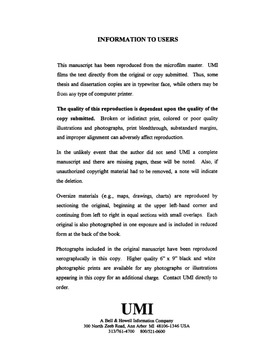| dc.contributor.advisor | Hobbs, Catherine, | en_US |
| dc.contributor.author | Roussell, Bridget Ann. | en_US |
| dc.date.accessioned | 2013-08-16T12:30:07Z | |
| dc.date.available | 2013-08-16T12:30:07Z | |
| dc.date.issued | 1998 | en_US |
| dc.identifier.uri | https://hdl.handle.net/11244/5671 | |
| dc.description.abstract | The encouragement the letters give to violence and further terror are products of their orality. Because they were composed by committees' deliberations and for the specific purpose of being read aloud, the letters are examples of what one could call written oratory. Like the ancient, pre-literate singers of songs, the popular societies used their (written) oral performances as a means of promoting group unity, reinforcing adherence to the nation, and conserving the values of the Revolution. The Thermidor addresses reveal a perspective on the Terror which is not the revulsion some historians have assumed to be the popular attitude in France, but rather support for terror based on an understanding of it as a means of the sans-culottes keeping control of the Revolutionary agenda. The addresses' oral qualities create texts which heighten rather than lessen the tensions and tendencies toward violence in the political situation. | en_US |
| dc.description.abstract | This study uses an understanding of myth derived from that of Northrop Frye. The myth of Thermidor, a narrative which argues that the Terror of 1793 to 1794 was Robespierre's tool for consolidating personal power by eliminating or terrorizing his political enemies, has served and continues to serve as the base narrative for histories of the French Revolution. The cultural and political message of this myth is the establishment of the futility of revolution; i.e., that it leads directly to terror and oppression. The letters written by the popular societies of provincial France, the creation of the Paris Jacobin Society, on the occasion of the ninth and tenth of Thermidor are the first telling of the Thermidor story after its creation. | en_US |
| dc.format.extent | v, 267 leaves ; | en_US |
| dc.subject | France History Revolution, 1789-1799. | en_US |
| dc.subject | History, European. | en_US |
| dc.subject | Language, Rhetoric and Composition. | en_US |
| dc.title | A Rhetorical analysis of the polular society addresses of Thermidor / | en_US |
| dc.type | Thesis | en_US |
| dc.thesis.degree | Ph.D. | en_US |
| dc.thesis.degreeDiscipline | Department of English | en_US |
| dc.note | Adviser: Catherine Hobbs. | en_US |
| dc.note | Source: Dissertation Abstracts International, Volume: 59-07, Section: A, page: 2482. | en_US |
| ou.identifier | (UMI)AAI9839805 | en_US |
| ou.group | College of Arts and Sciences::Department of English | |
